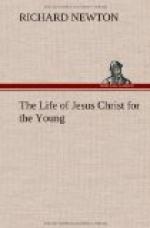“Pardon and Peace.” An officer who held a high position under the government of his country, and was a favorite with the king, was once brought before the judge and charged with a great crime. He took his place at the bar with the greatest coolness, and looked at the judge and jury and the great crowd of spectators as calmly as if he were at home, surrounded by his own family.
The trial began. The witnesses were called up, and gave clear evidence that he was guilty. Still he remained as calm and unmoved as ever. There was not the least sign of fear visible on his countenance; on the contrary, his face wore a pleasant smile.
At last the jury came in, and while the crowd in the court-room held their breath, declared that the prisoner was guilty. In an instant every eye was turned upon the prisoner to see what effect this sentence would have upon him. But just then, he put his hand in his bosom, drew out a paper, and laid it on the table. It was a pardon, a full, free pardon of all his offences, given him by the king, and sealed with the royal signet. This was the secret of his peace. This was what gave him such calmness and confidence in his dreadful position as a condemned prisoner.
And so Jesus gives his people pardon in such promises as these: “Though your sins be as scarlet, they shall be white as snow: though they be red like crimson, they shall be as wool,” Is. i: 16. “Let them return unto the Lord, for he will abundantly pardon.” Is. lv: 7. “All that believe are justified from all things.” Acts xiii: 39. These promises are like the king’s pardon which the officer had received. Faith in these promises brings pardon, and the pardon brings peace. And so, by what he is doing now, as well as by the miracles he performed when on earth, we are taught the precious truth, that—“The Son of man hath power to forgive sins.”
Then when we think of the wonderful miracles that Jesus did, let us always remember the illustrations they afford of the power he had to help—to comfort—to encourage—to protect—and to pardon.
Let us seek to secure all these blessings to ourselves, and then we shall find that what Jesus taught by his miracles will be very profitable teaching to us!
CHRIST TEACHING LIBERALITY
If we should attempt to mention all the parables which Jesus spoke, and the miracles which he performed, and the many other lessons which he taught, it would make a long list. As we have done before we can only take one or two specimens of these general lessons which Jesus taught.
We have one of these in the title to our present chapter, which is—Christ Teaching Liberality. This was a very important lesson for Jesus to teach. One of the sad effects of sin upon our nature is to make it selfish, and covetous. We are tempted to love money more than we ought to do. We are not so willing to part with it as we should be. And we never can be good and true Christians unless we overcome the selfishness of our sinful hearts, and not only learn to give, but to give liberally. The Bible teaches us that God not only expects his people to give, but, as St. Paul says, in one place, to give “cheerfully.” II. Cor. ix: 7.




